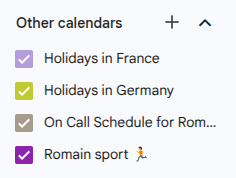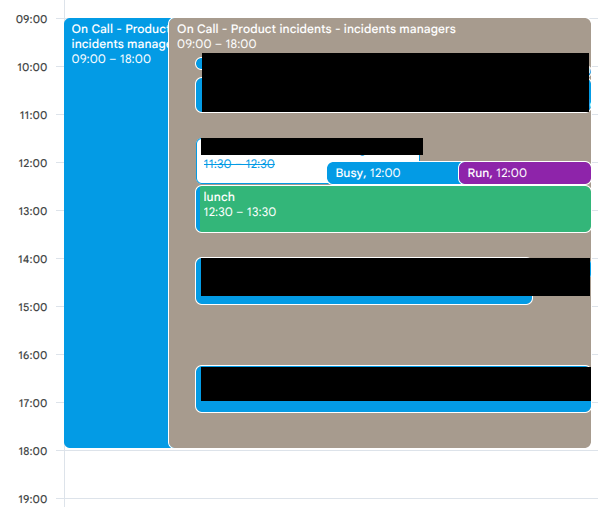At work, we use Google Calendars. I'm scheduling my workout/sports sessions in a separate, private Google Calendar. I'm also regularly on call during office hours - I'm getting assigned some days through another calendar provided by PagerDuty.

I added these 2 additional calendars to my work calendar as "external calendars", which only I can see.
But I need my colleagues to see when I'm busy because I'm going for a run over the lunch break, or when I'm on call. Hence a need to keep these 3 calendars in sync. One caveat though is that I want to keep my sports sessions "private": my coworkers do not need to know whether I'm going running, or to the gym, or whathever. They just need to know that I'm not available.
So I came up with a Google Apps Script that periodically runs (every hour) and does the following:
- Create "busy" events in my work calendar at the same time as my workouts.
- Create a copy of my "on call" events in my work calendar, coming from the Pager Duty calendar.
Of course if I update or delete a sports session, or if my on-call schedule changes, it gets updated in my work calendar too.
Here is the script:
const CONFIG = {
TARGET_EMAIL: "romain.pellerin@workemail",
SYNC_DAYS: 6, // Number of days to look ahead
TAG_PREFIX: "Source iCalUID:", // Unique identifier tag in description
TIME_WINDOW: {
START_HOUR: 8,
START_MINUTE: 30,
END_HOUR: 19,
END_MINUTE: 0,
},
CALENDARS: [
{
id: "some-id@group.calendar.google.com", // sports
isPrivate: true, // Will be renamed to 'Busy' and set private
color: CalendarApp.EventColor.MAUVE
},
{
id: "some-other-id@import.calendar.google.com", // pager duty
isPrivate: false,
},
],
};
// Convert limit times to minutes from start of day
const limitStartMins = CONFIG.TIME_WINDOW.START_HOUR * 60 + CONFIG.TIME_WINDOW.START_MINUTE;
const limitEndMins = CONFIG.TIME_WINDOW.END_HOUR * 60 + CONFIG.TIME_WINDOW.END_MINUTE;
// THE MAIN FUNCTION, to call periodically.
function syncGoogleCalendars() {
const userEmail = Session.getActiveUser().getEmail();
if (userEmail !== CONFIG.TARGET_EMAIL) {
Logger.log(`Skipping: Current user (${userEmail}) is not the target user.`);
return;
}
const now = new Date();
const futureDate = new Date(
now.getTime() + CONFIG.SYNC_DAYS * 24 * 60 * 60 * 1000
);
const targetCalendar = CalendarApp.getDefaultCalendar();
// Creates a Map: { 'source_uid_string' : CalendarEventObject }
const existingEventsMap = getExistingManagedEvents(
targetCalendar,
now,
futureDate
);
CONFIG.CALENDARS.forEach((sourceCalendarConfig) => {
syncSourceCalendar(
sourceCalendarConfig,
targetCalendar,
existingEventsMap,
now,
futureDate
);
});
// Cleanup orphans: any event remaining in the map was NOT found in the source calendars, so it should be deleted.
cleanupOrphanedEvents(existingEventsMap);
}
/**
* Fetches events from the target calendar and maps them by their Source UID.
* Only includes events created by this script (checked via regex).
*/
function getExistingManagedEvents(calendar, start, end) {
const events = calendar.getEvents(start, end);
const eventMap = new Map();
const uidRegex = new RegExp(`${CONFIG.TAG_PREFIX}\\s*([\\w.@-]+)`);
events.forEach((event) => {
const match = event.getDescription().match(uidRegex);
if (match && match[1]) {
eventMap.set(`${event.getStartTime()}-${match[1]}`, event); // Map Key: the source event UID
}
});
return eventMap;
}
function syncSourceCalendar(sourceCalendarConfig, targetCalendar, existingEventsMap, start, end) {
const sourceCalendar = CalendarApp.getCalendarById(sourceCalendarConfig.id);
if (!sourceCalendar) {
Logger.log(`Error: Could not find calendar ${sourceCalendarConfig.id}`);
return;
}
const sourceEvents = sourceCalendar.getEvents(start, end);
Logger.log(
`Processing ${sourceCalendarConfig.id}: ${sourceEvents.length} events found.`
);
sourceEvents.forEach((sourceEvent) => {
// Weekday Filter
const startTime = sourceEvent.getStartTime();
const endTime = sourceEvent.getEndTime();
const dayOfWeek = startTime.getDay(); // 0 = Sunday, 1 = Monday, ... 6 = Saturday
// If it is Sunday (0) or Saturday (6), skip this event.
if (dayOfWeek === 0 || dayOfWeek === 6) {
Logger.log(
`Skipping event on weekend from ${
sourceCalendarConfig.id
}: ${sourceEvent.getTitle()} on ${startTime}`
);
return;
}
// Convert event times to minutes
const eventStartMins = startTime.getHours() * 60 + startTime.getMinutes();
const eventEndMins = endTime.getHours() * 60 + endTime.getMinutes();
if (eventStartMins >= limitEndMins || eventEndMins <= limitStartMins) {
Logger.log(
`Skipping event outside time window (${CONFIG.TIME_WINDOW.START_HOUR}:${CONFIG.TIME_WINDOW.START_MINUTE} - ${CONFIG.TIME_WINDOW.END_HOUR}:${CONFIG.TIME_WINDOW.END_MINUTE}): "${sourceEvent.getTitle()}" (${startTime.getHours()}:${startTime.getMinutes()} - ${endTime.getHours()}:${endTime.getMinutes()})`
);
return;
}
const sourceUid = sourceEvent.getId();
const eventKey = `${sourceEvent.getStartTime()}-${sourceUid}`;
const existingEvent = existingEventsMap.get(eventKey);
// Determine Title and Visibility based on privacy setting
const targetTitle = sourceCalendarConfig.isPrivate
? "Busy"
: sourceEvent.getTitle();
if (existingEvent) {
updateEventIfChanged(existingEvent, sourceEvent, targetTitle);
existingEventsMap.delete(eventKey); // Remove from map to indicate this event is still valid (not an orphan)
} else {
createNewEvent(
targetCalendar,
sourceEvent,
sourceUid,
targetTitle,
sourceCalendarConfig.isPrivate,
sourceCalendarConfig.color
);
}
});
}
function createNewEvent(targetCalendar, sourceEvent, sourceUid, title, isPrivate, color) {
Logger.log(`Creating "${title}" on ${sourceEvent.getStartTime()}, color: ${color}`);
const options = {
description: `${CONFIG.TAG_PREFIX} ${sourceUid}\nCreated by Google Apps Script`,
location: sourceEvent.getLocation(),
sendInvites: false,
};
let newEvent;
if (sourceEvent.isAllDayEvent()) {
newEvent = targetCalendar.createAllDayEvent(
title,
sourceEvent.getStartTime(),
options
);
} else {
newEvent = targetCalendar.createEvent(
title,
sourceEvent.getStartTime(),
sourceEvent.getEndTime(),
options
);
}
// Set specific privacy settings
if (isPrivate) {
newEvent.setVisibility(CalendarApp.Visibility.PRIVATE);
}
if (color) newEvent.setColor(color);
newEvent.removeAllReminders();
}
/**
* Note: We blindly update title/time to ensure data consistency.
* To further optimize, you could check if values differ before setting.
*/
function updateEventIfChanged(targetEvent, sourceEvent, targetTitle) {
// We update the title to ensure "Busy" is maintained if the config changed or privacy was toggled
targetEvent.setTitle(targetTitle);
if (sourceEvent.isAllDayEvent()) {
// For all day events, we generally just check the day, but setAllDayDate is safe
targetEvent.setAllDayDate(sourceEvent.getStartTime());
} else {
targetEvent.setTime(sourceEvent.getStartTime(), sourceEvent.getEndTime());
}
}
/**
* Deletes any events remaining in the map.
*/
function cleanupOrphanedEvents(orphanMap) {
if (orphanMap.size === 0) {
Logger.log("No orphaned events to delete.");
return;
}
Logger.log(`Deleting ${orphanMap.size} orphaned events...`);
for (const [starttime_uid, event] of orphanMap) {
try {
Logger.log(
`Deleting ${event.getTitle()} (Source UID: ${event.getId()}) on ${event.getStartTime()}`
);
event.deleteEvent();
} catch (e) {
Logger.log(`Failed to delete event ${event.getId()} on ${event.getStartTime()}: ${e.message}`);
}
}
}
